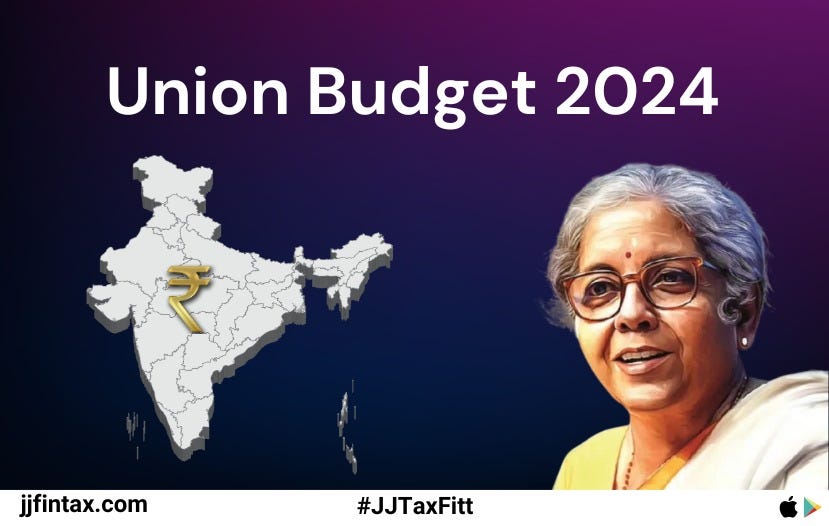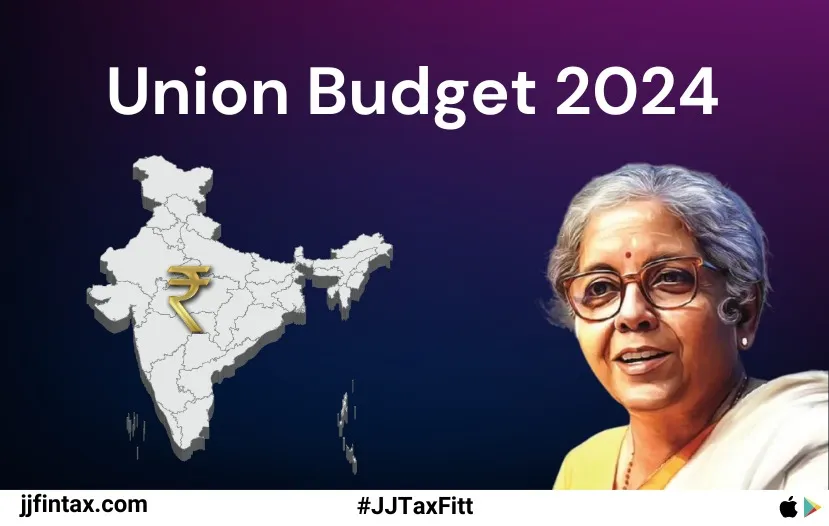
Budget 2024, unveiled by Finance Minister Nirmala Sitharaman, introduces a comprehensive set of measures aimed at supporting the economy, supporting businesses, stabilising markets, and easing the burden on taxpayers. Presented on July 23, the budget outlines nine key focus areas with a forward-looking perspective. Moreover, it underscores the imperative of directing attention towards the underprivileged, women, youth, and agricultural providers named as garib, mahilaye, yuva and annadata.

Tax changes
Finance Minister Nirmala Sitharaman announced changes to the new tax regime, proposing an increase in the standard deduction from INR 50,000 to INR 75,000.
The revised tax rate structure in the new regime is as follows:
● 0-3 lakh: Nil
● 3-7 lakh: 5%
● 7-10 lakh: 10%
● 10-12 lakh: 15%
● 12-15 lakh: 20%
● Above 15 lakh: 30%
Deduction on family pension for pensioners increased from INR 15000 to INR 25000.
Agriculture Sector
Productivity & Resilience in Agriculture
The release of 109 high-yielding and climate-resilient varieties of 32 field and cultivation crops for farmers this financial year was announced.
INR1.52 lakh crore allocation will be made for the agriculture and allied sectors.
The government will undertake a comprehensive review of research to develop climate-resilient seeds.
Additionally, in partnership with states, the government will promote digital public infrastructure for agriculture.
Over the next two years, one crore farmers will be initiated into natural farming.
Employment & skilling
The Budget announced a focus on increasing women's workforce participation by establishing hostels and creating partnerships for women-specific skilling programs.
To boost job creation in the manufacturing sector, a new scheme will incentivize the employment of first-time employees. This scheme offers incentives for EPFO contributions for the first four years of employment, benefiting both employees and employers.
Aiming to benefit 30 lakh youth, it will cover additional employment across all sectors. The government will reimburse employers up to Rs 3,000 per month for two years towards EPFO contributions for each additional employee, targeting the creation of 50 lakh new jobs.
The FM announced employment-linked skilling schemes under the PM's package, targeting first-time employees enrolled in the EPFO. These newcomers will receive a direct benefit transfer (DBT) of one month's salary, up to Rs 15,000, in three instalments upon entering the workforce in formal sectors.
The eligibility limit for this benefit is set at a monthly salary of Rs 1 lakh, expected to benefit 2.1 lakh youths.
Additionally, a PM Package comprising five schemes will be introduced to promote employment and skilling, with a total outlay of Rs 2 lakh crore.
Housing
Under the PM Awas Yojana Urban 2.0, the government aims to address the housing needs of the urban poor and middle class with an investment of Rs 10 lakh crore.
To make housing more affordable, a Rs 2.2 lakh crore initiative was announced.
The Budget also encourages states with high stamp duty charges to moderate their rates for everyone.
Additionally, there will be considerations for further reducing duties on properties purchased by women.
These initiatives will be integrated into urban development schemes, making them essential components of the broader strategy for urban growth.
These measures aim to facilitate affordable housing and support urban development, according to the Finance Minister.
Markets & investors
The Finance Minister announced a 12.5% tax rate on long-term capital gains for all assets, with an exemption limit increased from Rs.1 lakh to Rs 1.25 lakh annually.
On the sale of financial assets, short-term capital gains increased from 15% to 20%.
The Securities Transaction Tax (STT) will increase, with STT on futures rising from 0.0125% to 0.02% and STT on options increasing from 0.0625% to 0.10%.
Additionally, the proposal includes withdrawing the 20% TDS on repurchases by mutual funds or Unit Trust of India (UTI).
Economy & macros
The fiscal deficit for the year is estimated at 4.9% of GDP, as per Budget 2024.
The government plans to maintain strong fiscal support for infrastructure, allocating Rs 11.11 lakh crore for capital expenditure, which represents 3.4% of India's GDP.
Infrastructure push
Budget 2024 proposed to provide Rs 2.66 lakh crore for rural development.
Road connectivity projects will get Rs 26,000 crore in Bihar
12 industrial parks will be sanctioned.
Key Takeaways for Budget 2024
India has achieved three consecutive years of 7% GDP growth, solidifying its position as the fastest-growing economy among G20 nations.
GDP, which stands for Government, Development, and Performance, underscores India's commitment to robust developmental achievements amidst effective economic management.
The government will sustain its capital expenditure (capex) initiatives, underscoring their critical importance, as highlighted by the Finance Minister.
The India-Middle East-European Corridor (IMEC) project will proceed despite disruptions in the Red Sea region.
Revenue Secretary Sanjay Malhotra announced the withdrawal of 1.1 crore outstanding small direct tax demands for specific years, resulting in a fiscal impact of less than ₹3,500 crore.
The Finance Minister clarified that the lower tax rate will not be extended to new manufacturing units established after March 2024.
DIPAM Secretary Tuhin Kanta Pandey indicated that there is no fixed target for disinvestment in FY25.
Finance Minister Nirmala Sitharaman assured credit rating agencies that India is not only adhering to but surpassing its fiscal consolidation targets.
Finance Secretary TV Somanathan stated that the goal of reducing the Centre’s debt-to-GDP ratio to 40% needs to be re-evaluated, given the post-COVID-19 economic landscape.
JJ Tax

